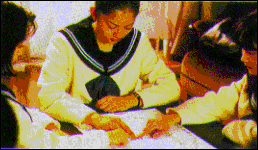

Girls Have A Fancy Of Death.

"Kokkuri"
by Hamasaki Hiroaki
Honorary Web Site English Translator: Jim Flack
--Jim's KUMI MIZUNO FAN PAGE is HERE!--
| --------------- |
High school student Mio works at a radio station as a disk jockey, going by the name "Michiru." As "Michiru," she says on the air that she enjoys making love to men, but in reality Mio is a lesbian. One night, Michiru poses this question to her listeners: How many are in her family, what is her age, and when will she die--and they must answer by using 'Kokkuri'. Kokkuri is the spiritual method to summon the sprit of the fox and let it answer some questions. One listener named Masami calls her friends Hiroko and Mio to do Kokkuri with her. However, Masami and Hiroko are unaware that Mio is "Michiru." It also turns out that Masami has an ulterior motive. Masami suspects that Hiroko is falling in love with her boyfriend Akira, so Masami wants to confirm her suspicion it by using Kokkuri. They summon Kokkuri and it answers their questions: "Michiru's" family consists of Michiru and her elder sister Asako; Michiru is 17 years old, and Michiru will die in one month. Suddenly Mio becomes afraid that her death is imminent. But Kokkuri also says that Hiroko will meet her true love in the near future. Hiroko gets encouraged and she makes a date with Akira. A few days later, Masami asks Mio and Hiroko to try Kokkuri again. Masami asks Kokkuri, "Who does Akira love: Masami or Hiroko?" Kokkuri replies that he loves Masami but it won't last. Later, Hiroko listens to Michiru's radio program and decides to become a emulate "Michiru." She goes to the street at night to meet young men and sleep with them. Mio is apprehensive of Hiroko because she loves her but knows that Hiroko is a girl. Mio begins to regret that she created the character "Michiru" on the radio. So Mio talks to Hiroko and realizes that they share a similar childhood trauma. Mio lost her mother when she was a child While swimming, Mio's mother drowned trying to save her. At the same time, young Hiroko lost a friend named Midori. Midori drowned and was found dead her apartment bathroom after she and Hiroko did Kokkuri togather. Mio wonders if Midori died in her place, despite not knowing each other. Later, Akira is found drowned and Hiroko turns up missing. Mio watches the news and she sees Hiroko with a little girl in red in the apartment where Midori died. Then Hiroko calls Mio at the radio station as she is playing the role of "Michiru." Mio replies, "There isn't any Michiru. It's me, Mio and I love you, Hiroko." Then, Mio goes to the apartment and sees that Hiroko is possessed by Midori's spirit and she has killed Masami. Hiroko tries to kill Mio but she can't because Midori's spirit disappears. Several days later, Mio is possessed by Midori's spirit and she commits double suicide with Hiroko.
I don't know if it is clear that Mio or Hiroko are possessed by Midori's ghost. The episodes about Midori's ghost are very ambiguous and full of symbolism. Of course, the director Mr. Zeze attmpted to make this point. But these episodes remind me of real double suicide of two girls which I mentioned at first. Even though the motive of suicide is meaningless or not, adolescent girls have a fancy of death, don't they? That is why I feel so strongly that this film is a good film about Japanese teenage girls as well as about horror. |
--------------- |
Index of Review | See data